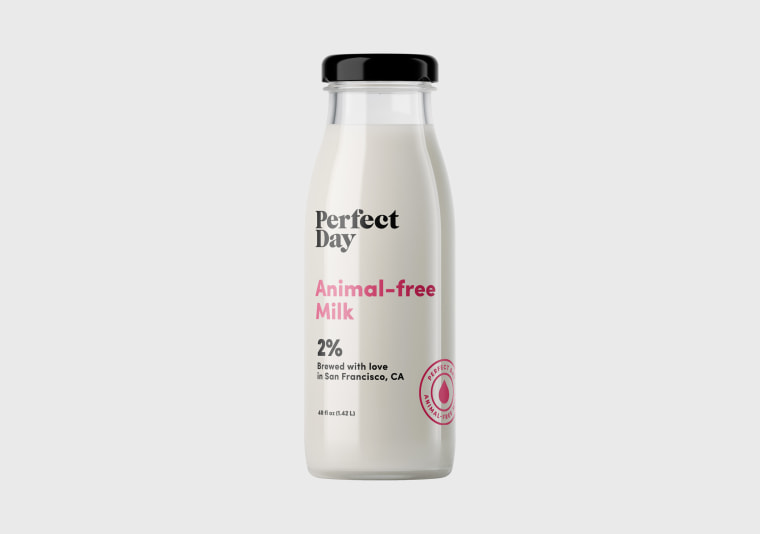
The old question “Got milk?” has a complicated answer these days, because it all depends on what you mean by “milk.”
Consumers could soon be faced with confusion in the dairy aisle as they wonder if the milk they’re drinking came from a cow — or was made in a lab.
Perfect Day Foods is one company creating a synthetic milk alternative. It's similar to milk in that it consists of casein and whey, the proteins found in milk. However, a cow was never used to produce their product. Instead, the animal-free dairy product is made in a lab using genetically engineered yeast programmed with DNA to produce the same proteins found in cow’s milk.
Silicon Valley-based Perfect Day Foods says its animal-free milk is better for the environment and healthier than cow’s milk because it’s lactose-free, hormone-free, antibiotic-free, gluten-free and cholesterol-free. The company also claims the product tastes more like milk than other plant-based milk alternatives. Plus, its overall environmental impact is substantially lower than that of conventionally produced milk, according to a preliminary report by The University of the West of England.
While some vegan consumers may be excited about the new alternatives coming to the market, dairy farmers aren’t. Many small dairy farmers are worried this new “fake milk” will confuse consumers and could put them out of business as they already face extinction from an oversupply of milk, increased competition from plant-based dairy alternatives, and industrial farming.
The U.S. dairy industry has been under extreme pressure recently, experiencing a sales decline since 2014, which is expected to continue until 2020, according to a report by Mintel. As a result, dairy farms have been closing in record numbers. In 1970 there were nearly 650,000 dairy farms in the U.S., but just 40,219 remained at the end of 2017, according to the U.S. Department of Agriculture.
Mike Eby, Chairman of the National Dairy Producers Organization and a seventh-generation dairy farmer, was forced to sell his herd of 60 dairy cows two years ago because he, like many others, couldn’t compete with corporate agriculture and the continuing decline in milk prices. He is worried Perfect Day’s product is so similar to milk’s composition that it could look and be labeled like milk produced from a cow, making it difficult for a consumer to decipher.
“If [processors] are successful in considering Perfect Day as milk, they [could] use Perfect Day to make ice cream or yogurt or cheese," Eby said. "And the worst part about it would be that it wouldn’t be labeled as such. No one would know the difference and they would actually claim there is no scientific difference.”

Currently, the Food and Drug Administration allows makers of almond milk, soy milk, and rice milk to label their products as “milk.” In countries such as England and Canada, where they are much more protective of dairy farming, those plant-based products aren’t permitted to use the word “milk,” and must use alternatives like “beverage” or “drink.” Many U.S. dairy farmers are fighting the FDA to enforce the definition of milk as “lacteal secretion” produced by “the complete milking of one or more healthy cows.” While the FDA has the definition in place, historically it hasn’t enforced it.
“It appears that the FDA is not very farmer friendly; they are more processor friendly,” said Eby. “So if history is our guide, look no further than to see how they have not taken proper care of the word ‘milk’ and they’ve allowed it to be exploited. So why would anyone think that this is any different?”
This week, Perfect Day Foods announced it had raised $34.75 million, bringing its total fundraising so far to $60 million. The company received $24.7 million in investments last year, making its product one of the most-backed early-stage food tech startups ever. Lab-grown meat companies such as Memphis Meats and Future Meat Technologies have garnered the interest of billionaire investors such as Bill Gates and Richard Branson, and food giants Tyson Foods and Cargill.
Kate Krueger, research director at cellular agriculture non-for-profit New Harvest, said there are significant benefits to making food products in a lab.
“When you make something in a lab, you’ve got a lot more control over it and what goes into it,” Krueger told NBC News. “So that means you make it healthier, you can make it more delicious, you can make it different; different from what you can produce otherwise.”
But many farmers are cautious about putting America's food supply in the hands of Silicon Valley investors instead of Lancaster County farmers.
“I think it’s more about making money than it is anything else,” said Lorraine Lewandrowski, an agricultural lawyer who represents farmers in New York and Pennsylvania. “I don’t see them pouring their heart and soul into land or people going for generations trying to hang on to a farm or people who are little farmers who work with their community. They’re the volunteer firemen, they’re on the board of education, they’re committed to an area. I don’t see that with these guys. They will go wherever the money is.”
In addition to the typical dairy items, Perfect Day's animal-free dairy proteins could also wind up in a lot more products after the company penned a partnership with Archer Daniels Midland, one of the world’s largest food ingredient providers.
"Instead of Perfect Day, Call it Perfect Storm," said Eby. "Because that's exactly what's been happening to the dairy industry. And it's coming at the worst time possible."
No comments:
Post a Comment